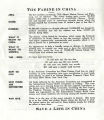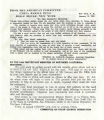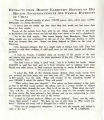| Title |
Articles relating to charity needs in China, 1921 |
| Alternate Title |
Latest word from the W.B.M.P. hospital of the American Board Mission, Lintsing, Shantung, China; The famine in China; Extracts from Bishop Lambuth's report of his recent investigations in the famine districts of China; Under the sway of hunger |
| Scanning Technician |
Jake Trauscht |
| Collection Number and Name |
Accn1107 bx 3 fd 1 |
| Description |
(1) Latest word from the W.B.M.P. hospital of the American Board Mission, Lintsing, Shantung, China (brochure) by Minnie Case Ellis; (2) "The famine in China" (fact sheet by the American Committee for China Famine Fund; (3) China Famine Fund, national and California officers lists; (4) Letter dated 15 January 1921 from the American Committee, China Famine Fund,appealing for contributions; (5) Extracts from Bishop Lambuth's report of his recent investigations in the famine districts of China; (6) "Under the sway of hunger," article by Lucia E. Lyons, from Outlook magazine, 23 Feb. 1921, pp. 301-305 |
| Creator |
Ellis, Minnie Case; Lyons, Lucia E. |
| Subject |
Famines--China--1921; China--Economic conditions--1921; Missionaries--China |
| Digitization Specifications |
Original scanned on Epson Expression 10000 XL and saved as 400 ppi TIFF. Display image generated in CONTENTdm |
| Publisher |
Digitized by J. Willard Marriott Library, University of Utah |
| Date |
1921-01-15; 1921-02-23; 1921 |
| Format |
application/pdf |
| Type |
Text |
| Identifier |
1107-03-01 (Correspondence, 1921) |
| Language |
eng |
| Relation |
http://archiveswest.orbiscascade.org/ark:/80444/xv57006 |
| Rights Management |
This material may be protected by copyright. Permission required for use in any form. For further information please contact the Manuscripts Division, Special Collections, J. Willard Marriott Library, University of Utah. |
| ARK |
ark:/87278/s6sn09m0 |
| Setname |
uum_sbts |
| ID |
1012955 |
| Reference URL |
https://collections.lib.utah.edu/ark:/87278/s6sn09m0 |

















